BIFO Interview by Jefferson Hack From KALEIDOSCOPE Issue 35 – FW 2019/20
Originally featured in KALEIDOSCOPE Issue 35 – FW 2019/20
According to legendary theorist and cultural agitator Franco ‘Bifo’ Berardi, the aim of political action is to create a condition of collective happiness. In conversation with Jefferson Hack, he discusses how, to survive the shit storm that is late-stage capitalism, we need to look away from identity politics and focus on the crisis of humanism, the relation between desire and pleasure, and the unexpected.
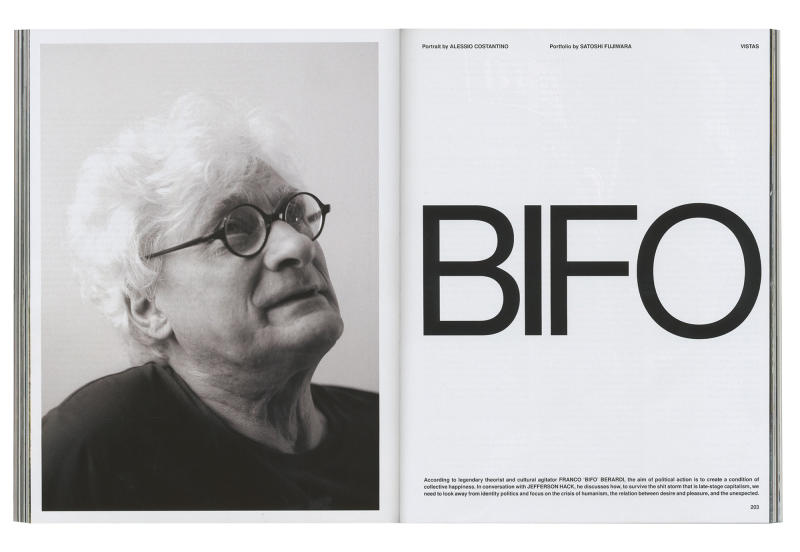
JEFFERSON HACK I remember doing an interview with Malcolm McLaren in 1997 where he told me, “The machines are taking over. We are becoming like machines and machines are becoming more like us.” He also described that era’s culture as “a karaoke culture—a casino of inauthenticity.” I’m interested in this idea of inauthenticity and authenticity, of authenticity as a fetishization of individuality. I wanted to ask you: What is authenticity to you? Is it a concept worth exploring in relation to your work?
FRANCO ‘BIFO’ BERARDI Just a few weeks ago, in the mess of things, I discovered something that I had forgotten, which is a piece of theatre—or a sort of opera, let’s say—that I made with some friends in 1983, titled Game Over. The piece was a musical, a rock opera based on a poem dedicated to the Gang of Four—you know, the Beijing trial, Jiang Qing, Wang Hongwen, Yao Wenyuan, and Zhang Chunqiao. (You see, I can remember their names!) Well, the Gang of Four was under trial in Beijing and at the same time I was discovering something completely new, which was the video game: the first console, a sort of big machine with space invaders inside. I was fascinated by the first generation of video games. At the end, the machine won. Every time. It was unavoidable. If you were a good player, you could go on for an hour—and I was not a good player, so I only lasted five minutes—but in the end, the machine always won. So I went to a place not far from Bologna and rented four machines (actually, the guy gave them to me for free), and I had four actors playing with the machines as the Gang of Four—and of course, the machine won in the end.For that work, I’d put together two very different things: the emerging video game and the political defeat of the Cultural Revolution in China. My point was that the revolution, the global movement of ’68, was being defeated by Margaret Thatcher and Ronald Reagan. The neoliberal counter-revolution was cancelling the culture of social solidarity. So for better or worse, the Beijing trial became a symbol of the defeat of the human race by the machine.
At the end of the game, the final words were: “Game over, the machine will win forever.” It was a very catastrophic, pessimistic piece of theatre.
JH Where was it performed?
FB It was performed for the first time at an amazing place called The Public Secret, which was an industrial space in the outskirts of Bologna. It used to be an ice factory once upon a time, maybe in the 19th century, I don’t know. Some friends squatted the place, put lights and music inside, and called it The Public Secret.
But let’s come back to your earlier question. You simultaneously asked me about the machine and about the concept of authenticity. To be honest, I don’t like the word “authenticity” in itself because I find it’s sort of a nostalgic, idealistic idea: the idea that somewhere in the past there was a soul we eventually lost, there was the “authentic,” but we live in the dimension of inauthenticity. I don’t think that an authentic self exists somewhere. There is nothing like the self— the self is a cultural construct, the effect of a relationship with one’s environment and other people. So I prefer to go straight to the point and say “happiness” or “unhappiness”—not “authenticity.” The point is not to go back to some authentic self; the point—the aim of political action, the goal of collective life—is to create a condition of collective happiness. I know that the words here need to be cautiously chosen, but I am not so cautious today. Can you forgive me?

JH Because the words are in the conceptual realm rather than the practical realm?
FB Yes. So I’m not looking for authenticity— but what am I looking for? In the last few days, I have been working out a conceptual distinction between desire and pleasure. Some weeks ago, I read a very interesting book about pleasure written by the Italian philosopher Paolo Godani. The title is Sul Piacere Che Manca—“The Missing Pleasure,” “The Pleasure We Don’t Have.”
All of a sudden, I realized that I’ve been talking all my life about desire following Deleuze and Guattari, but I’ve been unable to distinguish between desire and pleasure. For many years, I took pleasure for granted; my life was full of pleasure, so I could not distinguish it as a specific concept. Now things have changed, and I am increasingly unable to feel pleasure. Growing old is essentially stepping into a situation where pleasure is forbidden, so I’ve been obliged to understand what the difference is.
What is dramatic in senility is that pleasure disappears, but desire does not.
So what am I looking for? Well, it’s not an interesting question, because I’m not the case in point. The question is, what are we looking for? I would say we are looking for pleasure, not for desire. The Deleuze-Guattari philosophical imprint has been important for me: it has pinpointed the role of desire in social history. But now I understand from a psychoanalytic point of view, and from a political point of view, that the crucial thing is not desire—the crucial thing is the relation between desire and pleasure. This is what I’m looking for. Note that capitalism can be defined as interminable desire without pleasure. This is capitalism.
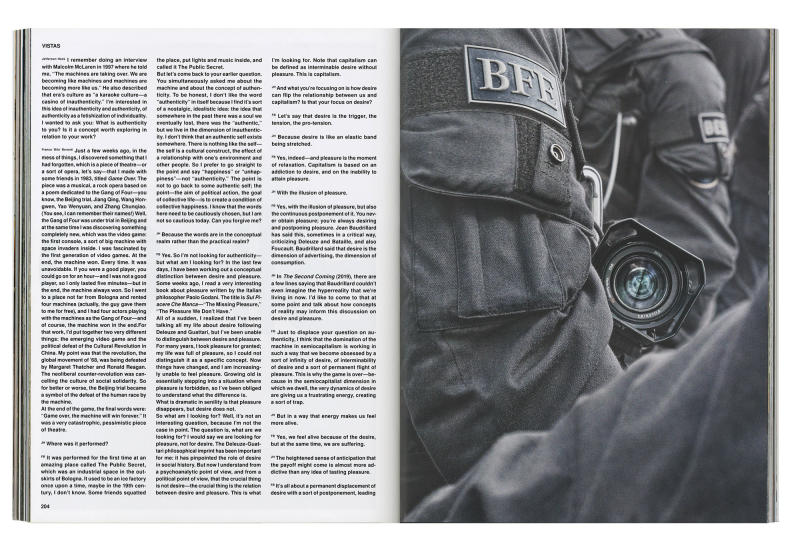
JH And what you’re focusing on is how desire can flip the relationship between us and capitalism? Is that your focus on desire?
FB Let’s say that desire is the trigger, the tension, the pro-tension.
JH Because desire is like an elastic band being stretched.
FB Yes, indeed—and pleasure is the moment of relaxation. Capitalism is based on an addiction to desire, and on the inability to attain pleasure.
JH With the illusion of pleasure.
FB Yes, with the illusion of pleasure, but also the continuous postponement of it. You never obtain pleasure; you’re always desiring and postponing pleasure. Jean Baudrillard has said this, sometimes in a critical way, criticizing Deleuze and Bataille, and also Foucault. Baudrillard said that desire is the dimension of advertising, the dimension of consumption.
JH In The Second Coming (2019), there are a few lines saying that Baudrillard couldn’t even imagine the hyperreality that we’re living in now. I’d like to come to that at some point and talk about how concepts of reality may inform this discussion on desire and pleasure.
FB Just to displace your question on authenticity, I think that the domination of the machine in semiocapitalism is working in such a way that we become obsessed by a sort of infinity of desire, of interminability of desire and a sort of permanent flight of pleasure. This is why the game is over—because in the semiocapitalist dimension in which we dwell, the very dynamics of desire are giving us a frustrating energy, creating a sort of trap.
JH But in a way that energy makes us feel more alive.
FB Yes, we feel alive because of the desire, but at the same time, we are suffering.
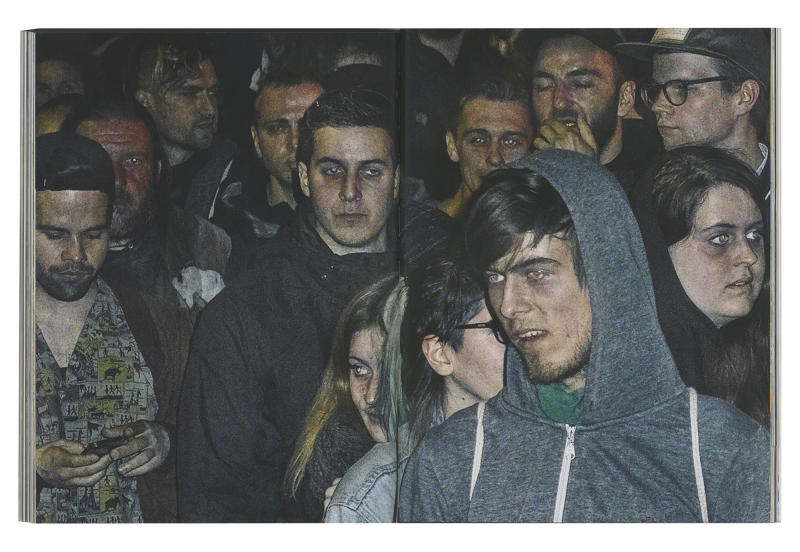
JH The heightened sense of anticipation that the payoff might come is almost more addictive than any idea of tasting pleasure.
FB It’s all about a permanent displacement of desire with a sort of postponement, leading to the erasure of pleasure. Pleasure is the victim of semiocapitalism, not desire.
JH Amazing. Elsewhere in the book, you talk about this idea of, “unawareness.” You describe how we have much more knowledge available to us, yet we also have less time to elaborate, so that paradox itself causes an explosion of unawareness.
FB It’s the paradox of the decider: when you won’t decide white or black, left or right, when you want to make a decision about an alternative, you need to know as much as possible about that subject. The problem is that in the present condition of acceleration of the infosphere, there’s an expansion of this sphere of potential knowledge you can- not exhaust. You cannot know everything, so you are permanently looking for more, and at a certain point you cannot decide. This paradox is the grave of politics: it becomes an impotent technique, because the art of decision is crucial in politics. Politics is all about decision and power. But how can you decide when the flow of information becomes thicker and faster every day? My impression is that we are already less and less capable of making decisions politically.
JH Fake news has been around for a very long time!
FB Yes, of course! The sphere of information and political information has always been about fake news. The problem is the political mind has to be critical. “Critical” in the etymological sense means being able to distinguish between good and bad, fake and true. In Understanding Media, McLuhan says that when the sphere of information goes beyond the dimension of sequential alphabetical information and enters the sphere of electronic simultaneity, the human mind stops being critical, and we go back to mythology. This is how, in ’64, McLuhan described the process that we are living now.
JH How do you see this mythology manifesting itself?
FB The political life of our time is all inside a mythological dimension. I don’t think that all those who voted for Donald Trump are stupid people. I think that they are tired of being unable to decide, and they understand that deciding rationally, critically, is impossible. They’ve entered the sphere of the shit storm, which perfectly defines what’s happening.

JH Can you define it quickly for me?
FB The shit storm is a condition in which the 212 speed and density of information are too much for both critical and emotional elaboration. When the human mind grows unable to understand sequentially and criticize the surrounding infosphere, and when the human soul becomes unable to elaborate emotionally, we enter a situation of white noise, of confusion, of the shit storm.
JH So your decision-making reverts to the mythological realm, and those mythologies are all based on historical templates.
FB Yes, you need an identification in a myth. You need something to grasp in the white noise, in the shit storm, in the confusion of the infosphere—and for some, national or racial identification is the only way. Am I Italian? That gives me a certain defense against the confusion. It’s the mythology of belonging.
JH That’s why we are seeing such an explosion in identity politics.
FB Yes. Identity politics is the catastrophe of our time, and it’s based on this acceleration of the infosphere and the need to re-identify.
JH Sticking with mythology, Joseph Campbell spoke about all myths, all fairytales, being based on binary opposites: there is only good and evil, true and false. There is no nuance. What I think is interesting about the time that we live in is that plurality is part of a new consciousness. This idea of nuance and plurality is central to the contemporary conversation around gender and race. I wonder where the myths are for this reality, because if all myths are binary opposites, then they do not correlate to these conscious leaps that are happening within society and humanity.
FB Of course. In a situation of loss of orientation, we lose the ability and the time for critical decision-making, so what we tend to do is to find the ground of our decision: action, annunciation in a mythological identification, which is easy and strong. We give ourselves an identity.
JH In a situation of total chaos, rationality doesn’t have much power.
FB That’s the point. In this situation, you need to grasp to a sort of mythological belonging—and at this point, it’s difficult to find a way out.
JH I’d like to talk about the relationship between sex and sensibility. When you talk about Spiegelhalter and these statistics on sex and intimacy, is it linked to precarity?
FB Absolutely, yes. Sexuality in the history of humankind, in the history that we have called human.
JH Because now we’re post-human.
FB Not only post-. The crisis of humanism is open in different perspectives: you can speak of “post-human,” but you can also talk about “trans-human” and “in-human.” These are possible declinations of the future. Anyway, sexuality is linked to the ability to detect something that does not belong to the sphere of syntax, of order. Ambiguity detects the meaning of ambiguous signs, which is absolutely fundamental in accessing the erotic sphere.
JH The statistics say that in the 1990s, people were making love five times a month. Today, it’s two and a half.
FB This is easy to understand, because if you note how many hours you spend in exchanging messages, those six hours per day are lost for eroticism.
JH So reclaim eroticism by switching off your phone and using the time for erotic elaboration! One of the things I was really struck by is American drug statistics: 97.5 million Americans misuse prescription drugs—and by misuse, I mean taking more than five or six prescription drugs at any one time.
FB Do you know about microdosing psychedelics?

JH What’s your point of view?
FB Well, I tried it for three months. At the beginning, it was not working, but the third or fourth time, it started having an effect. I’d read some literature about it beforehand; I also had my own personal experience, as I took LSD forty years ago in order to enhance the sphere of consciousness, to discover new states of imagination and to be happy. Now I take it as a mood stabilizer, although it also enhances my ability to be focused, productive and so on. In microdosing, you don’t look for an alteration or a hallucination, for a new experience—you want to stabilize the normal experience at a balanced level. Culturally speaking, that’s a huge transformation in the perception of drugs. Once upon a time, we took drugs for enhancing the area of consciousness, to enhance experience; now we take drugs to focus on the real.
JH It’s not about peak experiences.
FB Exactly. It’s not about being high, it’s about the finding right level of moods. I am a great reader of Jonathan Franzen—he doesn’t speak so much about drugs; it’s all about recovering, re-establishing a relationship with normalcy. It’s therapeutic in the dull sense, in the sad sense.
JH One of the things you talk about is breathing in the shit storm. How do we do that?
FB (laughs) Breathing is a good metaphor. I distinguish three moods of breathing: one is inspiration, the second is conspiration, and the third (and most interesting) is expiration. Inspiration is opening the personal breath to the cosmic breath, opening your mind to the surrounding info-sphere. Guattari speaks of Chaosmosis, the ability to synchronize your rhythm, your ritournelle, to your surroundings.
JH Is that why you talk about a “chaotic spasm”?
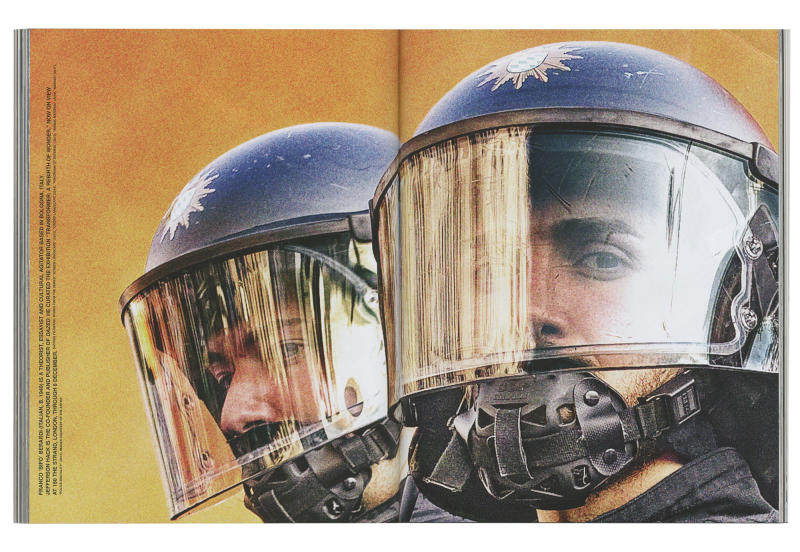
FB Exactly. When this attempt fails, you need to embrace the rhythm of the environment—but because the environment is going too fast, because the environment is poisonous, because you are sick, because your lungs have problems and so on, you can suffer at that point from a chaosmic spasm. Guattari used the expression “chaosmic spasm” in order to define the present relationship between the breathing organism and the social/ physical environment we live in. When the breathing relationship between atman and prana is good and healthy, you can step to a second level, which is the level of conspiration. Conspiration is breathing together: politically speaking, conspiration means the ability to produce a social effect of revolt, of transformation, of living together. Mantra is a perfect example of conspiration: your breathing enters in a vibration with the breathing of other people. In the case of mantra, breathing also becomes the production of a sonic wave, which then becomes a common vibration. The metaphor of a chaosmic spasm can be used on many levels. For example, precarization of labor is a chaosmic spasm: you cannot conspire with a person who is a competitor in the labor market; you cannot conspire with someone you perceive as a potential enemy, as a danger. When I say “chaosmic spasm,” I mean something that happens at the social level, and at the physical level: pollution is making inspiration difficult and poisonous, and conspiration difficult, and so on. Then I speak of expiration, which is emerging in the public discourse.
It means giving back: you breathe to the cosmos, but it has to do with extinction. The subject of extinction is entering the present cultural landscape. The most important social movement of today—the Greta Thunberg movement, the crusade of children—is all about extinction as a real danger. It’s extinction rebellion, although I find that expression a bit difficult to understand. Can you rebel against extinction? Yes and no. Against a condition of artificial poisoning of the atmosphere, you need to rebel against capitalism. But at the same time, I think that we must face the emergence of death in the public discourse. Death, the unspoken taboo of modernity, is entering the sphere of the public discourse.
JH Death is very linked with narcissism.
FB Of course. Narcissism becomes an obstacle to a healthy relationship with death. We need to relate to death, but modernity has refused any reflection on that.
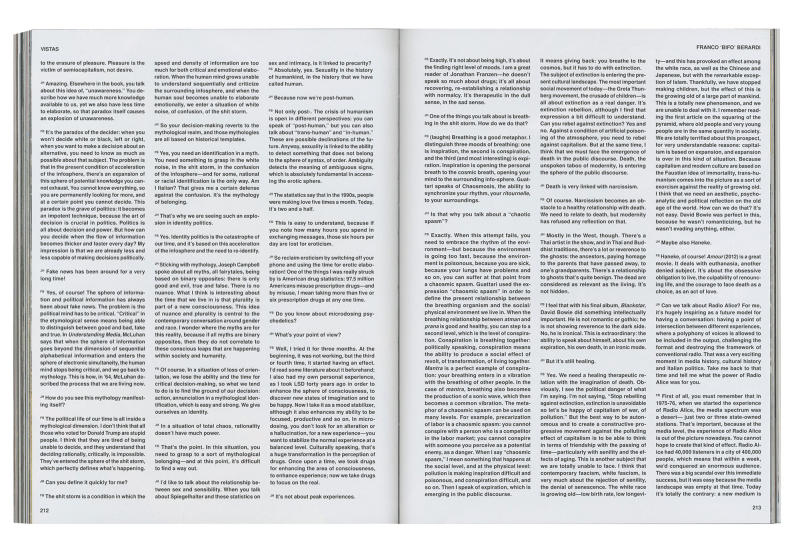
JH Mostly in the West, though. There’s a Thai artist in the show, and in Thai and Buddhist traditions, there’s a lot or reverence to the ghosts: the ancestors, paying homage to the parents that have passed away, to one’s grandparents. There’s a relationship to ghosts that’s quite benign. The dead are considered as relevant as the living. It’s not hidden.
FB I feel that with his final album, Blackstar, David Bowie did something intellectually important. He is not romantic or gothic; he is not showing reverence to the dark side. No, he is ironical. This is extraordinary: the ability to speak about himself, about his own expiration, his own death, in an ironic mode.
JH But it’s still healing.
FB Yes. We need a healing therapeutic relation with the imagination of death. Obviously, I see the political danger of what I’m saying. I’m not saying, “Stop rebelling against extinction, extinction is unavoidable so let’s be happy of capitalism of war, of pollution.” But the best way to be autonomous and to create a constructive progressive movement against the polluting effect of capitalism is to be able to think in terms of friendship with the passing of time—particularly with senility and the effects of aging. This is another subject that we are totally unable to face. I think that contemporary fascism, white fascism, is very much about the rejection of senility, the denial of senescence. The white race is growing old—low birth rate, low longevity—and this has provoked an effect among the white race, as well as the Chinese and Japanese, but with the remarkable exception of Islam. Thankfully, we have stopped making children, but the effect of this is the growing old of a large part of mankind. This is a totally new phenomenon, and we are unable to deal with it. I remember reading the first article on the squaring of the pyramid, where old people and very young people are in the same quantity in society. We are totally terrified about this prospect, for very understandable reasons: capital- ism is based on expansion, and expansion is over in this kind of situation. Because capitalism and modern culture are based on the Faustian idea of immortality, trans-humanism comes into the picture as a sort of exorcism against the reality of growing old. I think that we need an aesthetic, psycho- analytic and political reflection on the old age of the world. How can we do that? It’s not easy. David Bowie was perfect in this, because he wasn’t romanticizing, but he wasn’t evading anything, either.
JH Maybe also Haneke.
FB Haneke, of course! Amour (2012) is a great movie. It deals with euthanasia, another denied subject. It’s about the obsessive obligation to live, the culpability of renouncing life, and the courage to face death as a choice, as an act of love.
JH Can we talk about Radio Alice? For me, it’s hugely inspiring as a future model for having a conversation: having a point of intersection between different experiences, where a polyphony of voices is allowed to be included in the output, challenging the format and destroying the framework of conventional radio. That was a very exciting moment in media history, cultural history and Italian politics. Take me back to that time and tell me what the power of Radio Alice was for you.
FB First of all, you must remember that in 1975-76, when we started the experience of Radio Alice, the media spectrum was a desert— just two or three state-owned stations. That’s important, because at the media level, the experience of Radio Alice is out of the picture nowadays. You cannot hope to create that kind of effect. Radio Alice had 40,000 listeners in a city of 400,000 people, which means that within a week, we’d conquered an enormous audience. There was a big scandal over this immediate success, but it was easy because the media landscape was empty at that time. Today it’s totally the contrary: a new medium is just adding something to the white noise. I would say that today, we need the opposite.
JH Silence.
FB Silence, yes! Silence is what we need, silence as a political act. Of course, it’s difficult to listen to silence— John Cage comes to mind—but that difficult thing is exactly what we need now. I also see another aspect of the experience of Radio Alice, which is much more about breathing together. So the question is, how can we create new possibilities of conspiration in a dimension of hyper-saturation of the infosphere? You know, I have been involved personally, politically with the Occupy movement for ten years. That movement has created a totally different media situation; I don’t want to compare it to the media dimension of the ‘70s, but I see a strong analogy. Occupy exploded at a time when the financial sphere had dominated and paralyzed the social dimension, the social body. It’s a situation in which the general intellect has grown central in the capitalist reproduction. Occupy has been a movement of cognitive workers, everywhere, also in Egypt, Syria.
JH What happened is that Twitter and Facebook were given the credit as tools for the enrichment of the democratic process.
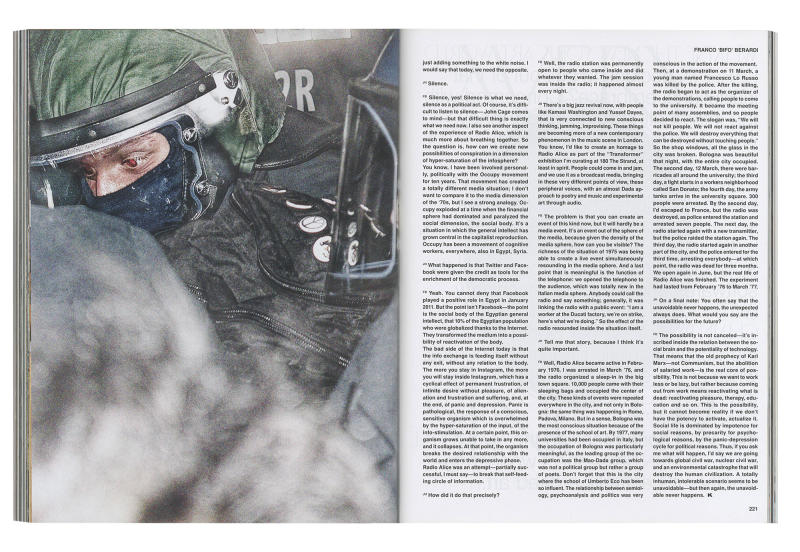
FB Yeah. You cannot deny that Facebook played a positive role in Egypt in January 2011. But the point isn’t Facebook—the point is the social body of the Egyptian general intellect, that 10% of the Egyptian population who were globalized thanks to the Internet. They transformed the medium into a possibility of reactivation of the body.
The bad side of the Internet today is that the info exchange is feeding itself without any exit, without any relation to the body. The more you stay in Instagram, the more you will stay inside Instagram, which has a cyclical effect of permanent frustration, of infinite desire without pleasure, of alienation and frustration and suffering, and, at the end, of panic and depression. Panic is pathological, the response of a conscious, sensitive organism which is overwhelmed by the hyper-saturation of the input, of the info-stimulation. At a certain point, this organism grows unable to take in any more, and it collapses. At that point, the organism breaks the desired relationship with the world and enters the depressive phase. Radio Alice was an attempt—partially successful, I must say—to break that self-feeding circle of information.
JH How did it do that precisely?
FB Well, the radio station was permanently open to people who came inside and did whatever they wanted. The jam session was inside the radio; it happened almost every night.
JH There’s a big jazz revival now, with people like Kamasi Washington and Yussef Dayes, that is very connected to new conscious thinking, jamming, improvising. These things are becoming more of a new contemporary phenomenon in the music scene in London. You know, I’d like to create an homage to Radio Alice as part of the “Transformer” exhibition I’m curating at 180 The Strand, at least in spirit. People could come in and jam, and we use it as a broadcast media, bringing in these very different points of view, these peripheral voices, with an almost Dada approach to poetry and music and experimental art through audio.
FB The problem is that you can create an event of this kind now, but it will hardly be a media event. It’s an event out of the sphere of the media, because given the density of the media sphere, how can you be visible? The richness of the situation of 1975 was being able to create a live event simultaneously resounding in the media sphere. And a last point that is meaningful is the function of the telephone: we opened the telephone to the audience, which was totally new in the Italian media sphere. Anybody could call the radio and say something; generally, it was linking the radio with a public event: “I am a worker at the Ducati factory, we’re on strike, here’s what we’re doing.” So the effect of the radio resounded inside the situation itself.
JH Tell me that story, because I think it’s quite important.
FB Well, Radio Alice became active in February 1976. I was arrested in March ’76, and the radio organized a sleep-in in the big town square. 10,000 people came with their sleeping bags and occupied the center of the city. These kinds of events were repeated everywhere in the city, and not only in Bologna: the same thing was happening in Rome, Padova, Milano. But in a sense, Bologna was the most conscious situation because of the presence of the school of art. By 1977, many universities had been occupied in Italy, but the occupation of Bologna was particularly meaningful, as the leading group of the occupation was the Mao-Dada group, which was not a political group but rather a group of poets. Don’t forget that this is the city where the school of Umberto Eco has been so influent. The relationship between semiology, psychoanalysis and politics was very conscious in the action of the movement. Then, at a demonstration on 11 March, a young man named Francesco Lo Russo was killed by the police. After the killing, the radio began to act as the organizer of the demonstrations, calling people to come to the university. It became the meeting point of many assemblies, and so people decided to react. The slogan was, “We will not kill people. We will not react against the police. We will destroy everything that can be destroyed without touching people.” So the shop windows, all the glass in the city was broken. Bologna was beautiful that night, with the entire city occupied. The second day, 12 March, there were barricades all around the university; the third day, a fight starts in a workers neighborhood called San Donato; the fourth day, the army tanks arrive in the university square. 300 people were arrested. By the second day, I’d escaped to France, but the radio was destroyed, as police entered the station and arrested seven people. The next day, the radio started again with a new transmitter, but the police raided the station again. The third day, the radio started again in another part of the city, and the police entered for the third time, arresting everybody—at which point, the radio was dead for three months. We open again in June, but the real life of Radio Alice was finished. The experiment had lasted from February ’76 to March ’77.
JH On a final note: You often say that the unavoidable never happens, the unexpected always does. What would you say are the possibilities for the future?
FB The possibility is not canceled—it’s in- scribed inside the relation between the social brain and the potentiality of technology. That means that the old prophecy of Karl Marx—not Communism, but the abolition of salaried work—is the real core of possibility. This is not because we want to work less or be lazy, but rather because coming out from work means reactivating what is dead: reactivating pleasure, therapy, education and so on. This is the possibility, but it cannot become reality if we don’t have the potency to activate, actualize it. Social life is dominated by impotence for social reasons, by precarity for psychological reasons, by the panic-depression cycle for political reasons. Thus, if you ask me what will happen, I’d say we are going towards global civil war, nuclear civil war, and an environmental catastrophe that will destroy the human civilization. A totally inhuman, intolerable scenario seems to be unavoidable—but then again, the unavoidable never happens.
Franco ‘Bifo’ Berardi (Italian, b.1949) is a theorist, essayist and cultural agitator based in Bologna, Italy.
Jefferson Hack is the co-founder and publisher of Dazed. He recently curated the exhibition “Transformer: A Rebirth Of Wonder,” at 180 The Strand, London.Satoshi Fujiwara (Japanese, b. 1984) is an artist and photographer currently based in Berlin, Germany.
Works from the series “Screen Landscape” (2019), “Crowd Landscape” (2019), “Panorama Of Defense” (2019), “Animal Material (2018), “Mayday” (2017), “Police Brutality” (2017). Image courtesy of the artist.